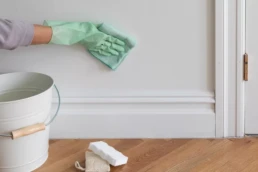Sharing a home with pets means sharing more than just love and companionship — it also means sharing muddy paw prints, the occasional accident, spilled food, and fur that somehow finds its way everywhere. For most pet owners, keeping floors clean is a daily task. But here’s the catch: not all floor cleaners are safe for your furry family members.
Dogs and cats spend much of their lives close to the ground. They lie on the floor, lick their paws after walking across it, and, in the case of curious puppies or kittens, sometimes even lick or chew surfaces. If the floor has been cleaned with harsh chemicals, your pet is at risk of ingesting residues that can irritate their skin, upset their stomach, or even cause serious health problems. Strong fumes from ammonia or bleach can also affect pets with sensitive respiratory systems, leading to coughing, sneezing, or more severe reactions.
This makes the choice of floor cleaner more than just a matter of convenience — it’s a matter of safety. Unfortunately, many mainstream cleaning products that promise sparkling results hide ingredients that are toxic to animals. Ammonia, phenols, chlorine, formaldehyde, and strong artificial fragrances are just a few common culprits. While they may leave your floors looking shiny, they can leave your pets vulnerable.
The good news? There are plenty of safe alternatives. In recent years, an entire market of pet-safe, eco-friendly cleaners has grown, offering products that are tough on dirt but gentle on pets. From commercial brands like Bona Free & Simple and Better Life, to natural DIY mixes made with castile soap and baking soda, to specialized enzymatic cleaners that neutralize pet accidents, the options are both safe and effective.
In this guide, we’ll break down exactly what makes a cleaner pet-safe, highlight the ingredients to avoid, and share the best products trusted by pet owners and professionals alike. We’ll also explore real-world reviews from Amazon, Reddit, and pet care communities, so you know what works in actual homes with pets — not just in advertisements. Finally, we’ll give you practical cleaning tips to keep your floors fresh without putting your pets at risk.
Because at the end of the day, your pets deserve a home that’s not only clean, but safe. And with the right floor cleaner, you can have both.
Why Regular Floor Cleaners Can Be Unsafe for Pets
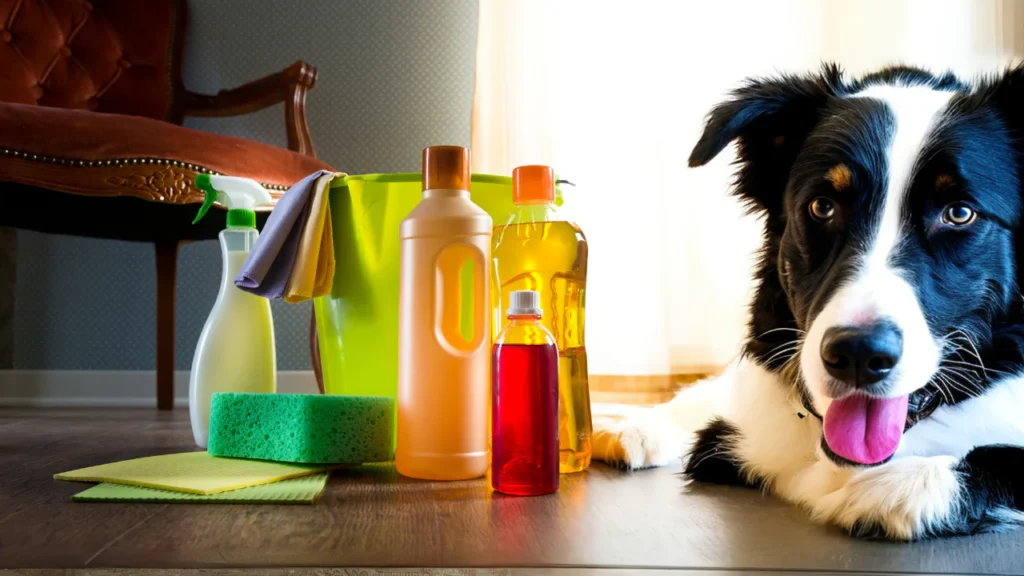
Most floor cleaners on the shelves are designed to tackle grease, stains, and germs quickly — but they’re rarely designed with pets in mind. What’s safe for humans walking in shoes can be unsafe for dogs and cats who live much closer to the floor and interact with it differently.
Common Harmful Ingredients
- Ammonia: Found in many “heavy-duty” cleaners, ammonia gives off strong fumes that irritate pets’ lungs. Cats in particular are sensitive, and exposure can lead to coughing, watery eyes, or lethargy.
- Bleach & Chlorine: While effective at disinfecting, these chemicals can cause burns to paws or skin and may cause stomach upset if pets lick treated surfaces.
- Phenols: Often used in disinfectants with pine or citrus scents, phenols are toxic to both cats and dogs and can damage the liver.
- Formaldehyde & Glycol Ethers: These are sometimes present in multipurpose cleaners and have been linked to long-term health risks for pets.
- Strong Artificial Fragrances: Many cleaners rely on synthetic scents to smell “fresh.” Unfortunately, these perfumes can trigger respiratory problems in sensitive pets.
How Pets Get Exposed
Unlike humans, pets don’t just walk across the floor — they live on it. Dogs nap on hardwood, cats lick their paws after walking on tile, and both can absorb chemicals through their paw pads. Even when cleaners dry, residues can remain, turning everyday playtime into a hidden health hazard.
Real-World Pet Owner Concerns
On forums like r/dogs and r/cats, countless owners share stories of pets getting sick after floor cleaning. A common thread is dogs vomiting or drooling after licking freshly mopped floors, or cats showing signs of paw irritation. One pet owner described their Labrador developing a persistent cough after they began using a pine-scented disinfectant on floors — the problem stopped as soon as they switched to a pet-safe brand.
The Long-Term Risks
Repeated exposure, even in small amounts, adds up. Pets can develop chronic respiratory issues, skin sensitivities, or organ stress when exposed to harsh chemicals over months or years. Veterinarians often advise avoiding household cleaners with “pine,” “citrus,” or “antibacterial” labels, as these are most likely to contain phenols or other irritants.
Bottom line: Regular floor cleaners may leave your house spotless, but they can quietly put your pets at risk. The good news is that safer alternatives exist — cleaners designed to remove dirt and germs without leaving behind harmful residues.
What Makes a Floor Cleaner Pet-Safe?
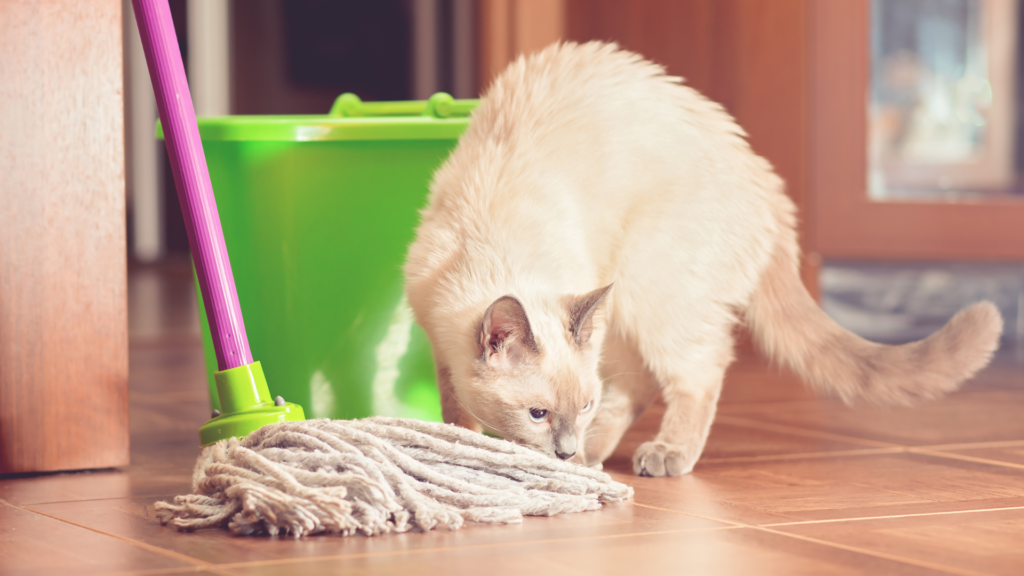
Not every product labeled “green” or “natural” is automatically safe for pets. True pet-safe floor cleaners are designed to clean effectively without leaving behind residues or fumes that can harm dogs and cats. Understanding what makes them safe will help you cut through marketing noise and make confident choices.
1. Non-Toxic, Biodegradable Ingredients
Pet-safe cleaners rely on plant-based surfactants and mild cleaning agents instead of harsh chemicals. Castile soap, coconut-derived cleansers, and baking soda are common ingredients. These break down naturally and don’t linger on floors where pets walk and play.
2. pH-Balanced Formulas
Harshly acidic or alkaline cleaners can irritate pets’ paws and damage floor finishes. A pet-safe cleaner is pH-balanced — strong enough to lift dirt, but gentle enough to avoid leaving caustic residues.
3. Free From Harsh Chemicals
Pet-safe cleaners avoid ingredients like ammonia, chlorine bleach, phenols, and formaldehyde. They also skip parabens and phthalates, which may disrupt hormones and cause allergic reactions in sensitive animals.
4. No Heavy Fragrances or Essential Oils
While humans love a fresh-smelling home, strong fragrances are often overwhelming for pets, whose sense of smell is far sharper than ours. Essential oils like tea tree, eucalyptus, and citrus can even be toxic to cats and dogs. Pet-safe cleaners usually have little to no scent or use light, non-toxic natural fragrances like lavender water or vinegar derivatives in very small concentrations.
5. Residue-Free Cleaning
One of the most important factors: safe cleaners don’t leave sticky or chemical residues behind. Pets constantly lick their paws, and any leftover cleaner can end up in their stomachs. Products labeled “no rinse required” are often best, as they dry quickly and evenly.
6. Quick Drying
The faster a cleaner dries, the less chance pets have to walk across wet areas and absorb moisture through their paw pads. Spray-and-wipe or mist-on formulas are usually safer than heavy bucket-and-mop styles.
7. Recognized Safety Certifications
Look for independent certifications that back up safety claims:
- EPA Safer Choice Seal – ensures ingredients meet strict human and environmental health standards.
- Green Seal or EcoLogo – verifies eco-friendly and non-toxic formulations.
- Cruelty-Free Certification – ensures no animal testing, aligning with pet-friendly values.
8. Tested and Trusted by Pet Owners
Real-world reviews matter. Products like Bona Free & Simple or Better Life are consistently praised by pet parents for being effective yet gentle. In online communities, many owners specifically mention peace of mind knowing their dogs and cats can walk on freshly cleaned floors without risk.
In short: A pet-safe cleaner is one that’s tough on dirt but invisible to your pets — no harmful fumes, no sticky residue, no toxic oils, and no irritation. When in doubt, read the label closely and avoid anything with warnings about skin contact, ventilation, or toxic hazards.
Best Types of Pet-Safe Floor Cleaners
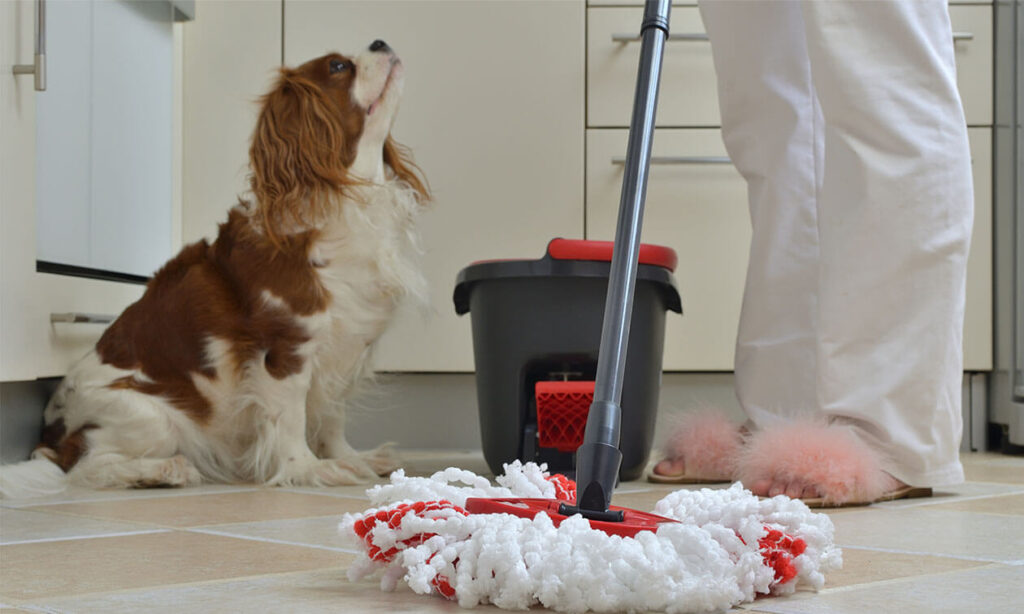
Pet owners have more options today than ever before when it comes to safe cleaning. From eco-friendly commercial products to DIY solutions you can mix at home, the right choice depends on your flooring type, your lifestyle, and how messy your pets can be. Below are the safest categories to consider — with real examples and pros/cons.
1. Pet-Safe Commercial Floor Cleaners
These are ready-made products specifically designed for households with pets. They’re non-toxic, pH-balanced, and usually certified by safety standards.
- Bona Free & Simple Hardwood Floor Cleaner
- Why it’s safe: Free of dyes and fragrances; GREENGUARD Gold Certified.
- Best for: Hardwood and sealed floors.
- User insights: Amazon reviewers praise it for leaving floors streak-free while “not worrying if the dog licks his paws right after.”
- Better Life Naturally Dirt-Destroying Floor Cleaner
- Why it’s safe: Plant-based, biodegradable formula without harsh chemicals.
- Best for: Hardwood, tile, laminate, and vinyl.
- User insights: Frequently mentioned on Reddit’s r/Pets as a reliable all-rounder; some users note it has a very mild citrus scent.
- Puracy Natural Multi-Surface Cleaner
- Why it’s safe: Developed by doctors, non-toxic, safe around pets and children.
- Best for: Multi-surface cleaning, including sealed wood and tile.
- User insights: Highly rated for versatility — one user said it “handled muddy paw prints on tile and didn’t irritate my cat’s paws.”
2. DIY Pet-Safe Cleaners
For pet owners who prefer homemade solutions, a few simple recipes can be effective and safe.
- Castile Soap Solution:
- Mix a few drops of liquid castile soap with warm water.
- Works well for sealed hardwood and tile.
- Safe, gentle, and leaves no toxic residue.
- Baking Soda Spot Cleaner:
- Perfect for deodorizing pet accident spots on hard floors.
- Sprinkle, let sit, then wipe with damp microfiber.
- Why DIY works: Full control over ingredients, cost-effective, no hidden chemicals.
- Drawback: Less convenient than commercial sprays, and not as effective for heavy messes or disinfection.
3. Enzyme-Based Pet Mess Cleaners
These are essential for homes with dogs or cats prone to accidents. Enzyme cleaners break down urine, feces, and vomit at the molecular level, eliminating both stains and odors.
- Nature’s Miracle Hard Floor Cleaner
- Why it’s safe: Enzyme-based, no harsh chemicals.
- Best for: Pet urine, feces, vomit on hardwood, tile, linoleum.
- User insights: Pet owners consistently say it “erases both the smell and the stain,” making it a must-have for puppy training.
- Rocco & Roxie Professional Strength Stain & Odor Eliminator
- Why it’s safe: Chlorine-free, enzyme-powered.
- Best for: Stubborn messes and lingering odors.
- User insights: Highly recommended on pet forums for deep odor removal; one cat owner said it “finally stopped repeat accidents in the same spot.”
4. Multi-Surface Eco-Friendly Cleaners
These are useful in homes with mixed flooring (hardwood, laminate, tile). They’re designed to work safely across different surfaces without leaving behind toxic residues.
- Aunt Fannie’s Vinegar Wash Floor Cleaner
- Why it’s safe: Food-grade vinegar base, essential oils in safe concentrations.
- Best for: Tile, vinyl, sealed wood.
- User insights: Loved by eco-conscious pet owners; some note a light vinegar scent that fades quickly.
- Seventh Generation Free & Clear Floor Cleaner
- Why it’s safe: Non-toxic, no fragrances, plant-based.
- Best for: General cleaning across multiple surfaces.
- User insights: Reviewers with cats highlight peace of mind: “No paw irritation even after daily cleaning.”
5. Products to Be Cautious With
Some cleaners claim to be “natural” or “green” but still use essential oils (like tea tree, eucalyptus, or citrus) at unsafe levels for pets. Always read labels carefully. For example:
- Tea tree oil: toxic to cats and dogs in small amounts.
- Pine oil: dangerous for cats, linked to liver damage.
- Strong citrus oils: can cause vomiting or drooling.
Quick Recap
- Everyday cleaning: Stick to pH-balanced, commercial pet-safe sprays like Bona Free & Simple or Better Life.
- Accidents: Enzyme cleaners are a must-have for pet households.
- Budget-friendly option: DIY castile soap solutions for safe, general cleaning.
- Avoid: Any cleaner with bleach, ammonia, phenols, or strong essential oils.
Pro Tip from Pet Parents: Many reviewers say they keep two cleaners on hand: one all-purpose floor cleaner for daily use and one enzyme cleaner specifically for pet messes. This combination covers both routine cleaning and emergencies without risking their pets’ health.
Comparison of Pet-Safe Floor Cleaners
| Cleaner / Brand | Type | Pet Safety Rating | Best For | Cost Level |
| Bona Free & Simple | Commercial | Excellent | Hardwood & sealed floors | Medium |
| Better Life Floor Cleaner | Commercial | Excellent | Multi-surface (hardwood, tile, vinyl) | Medium |
| Puracy Natural Cleaner | Commercial | Excellent | Multi-surface; homes with kids & pets | Medium–High |
| Aunt Fannie’s Vinegar Wash | Eco/Natural | Good–Very Good | Tile, vinyl, sealed wood | Low–Medium |
| Seventh Generation Free & Clear | Eco/Natural | Excellent | Multi-surface, fragrance-free | Medium |
| Nature’s Miracle Hard Floor | Enzyme Cleaner | Excellent | Pet urine, feces, vomit on hard floors | Medium |
| Rocco & Roxie Stain & Odor Remover | Enzyme Cleaner | Excellent | Stubborn odors & accidents | Medium–High |
| DIY Castile Soap Solution | DIY | Excellent | Budget-friendly daily cleaning | Low |
| DIY Baking Soda Spot Cleaner | DIY | Excellent | Spot deodorizing & stain removal | Very Low |
Quick Takeaway:
- Daily cleaning: Bona, Better Life, or Puracy are the safest bets.
- Accidents/odor removal: Enzyme cleaners (Nature’s Miracle, Rocco & Roxie).
- Budget-friendly & simple: DIY castile soap or baking soda solutions.
Buying Guide: Choosing the Right Floor Cleaner for Pet Homes
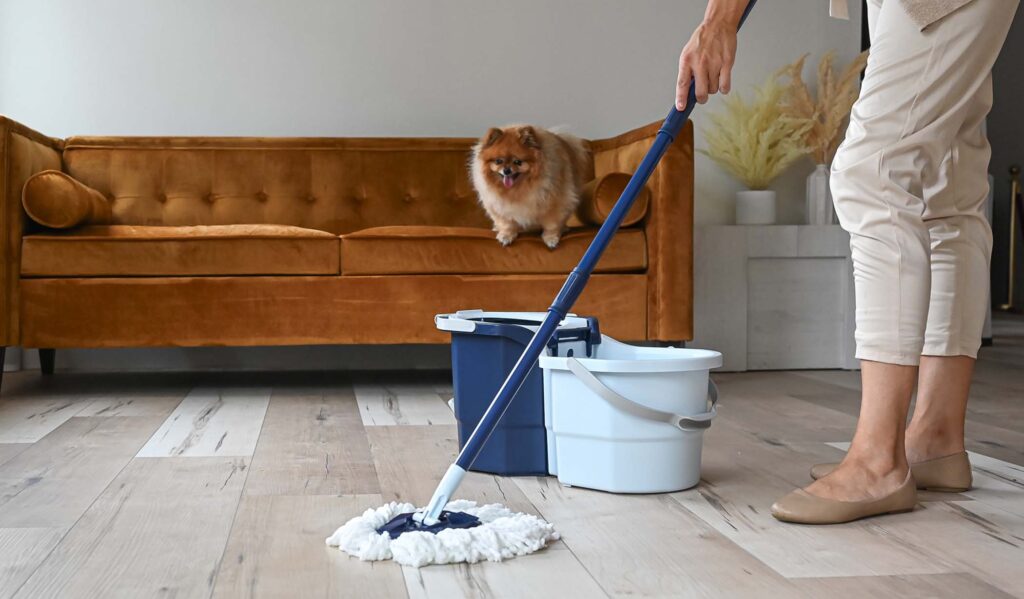
With so many “eco-friendly” and “all-natural” claims on labels, it can be hard to know which products are truly safe for pets. Here’s how to cut through the marketing and make a confident, pet-safe choice.
1. Read the Label Closely
If the cleaner warns about ventilation, skin contact, or keeping children and pets away until dry, that’s a red flag. A truly pet-safe cleaner won’t carry these warnings. Look for phrases like non-toxic, biodegradable, or pH-balanced.
2. Watch for Hidden Chemicals
Even products that sound natural may contain unsafe ingredients:
- Phenols (often in pine-scented cleaners) – toxic to cats and dogs.
- Ammonia or bleach – can burn paw pads and release harmful fumes.
- Essential oils (like tea tree, eucalyptus, citrus) – natural but toxic in higher concentrations.
3. Look for Certifications
Trust seals backed by independent testing:
- EPA Safer Choice – ensures human and pet health safety.
- Green Seal or EcoLogo – environmental and toxicity checks.
- Leaping Bunny / Cruelty-Free – aligns with pet-friendly values.
4. Match the Cleaner to Your Floor Type
- Hardwood/Sealed Wood: Use a hardwood-specific cleaner (Bona Free & Simple, Better Life).
- Tile/Vinyl/Laminate: Multi-surface natural cleaners (Puracy, Seventh Generation).
- Pet Accident Zones: Enzyme cleaners (Nature’s Miracle, Rocco & Roxie).
5. Consider Your Household Needs
- Multi-pet homes: Stick to unscented or fragrance-free options, as cats are especially sensitive.
- Busy families: Spray-and-wipe cleaners dry faster and reduce the chance of pets walking on wet spots.
- Budget-conscious owners: DIY options like castile soap solutions are affordable and safe.
6. Avoid Overpowering Scents
What smells “fresh” to humans can overwhelm pets. A strong pine or citrus scent can trigger drooling, vomiting, or respiratory issues. Always choose low-scent or fragrance-free formulas.
7. Real-World Test
Before committing, test the cleaner in a small area. Mop a section of floor, let it dry, then observe your pet. If they show irritation, coughing, or excessive paw licking, stop using it.
Bottom line: The best floor cleaner is one that cleans effectively, dries quickly, and leaves no harmful residues. For daily cleaning, stick to hardwood-safe or multi-surface commercial cleaners; for accidents, always keep an enzyme cleaner handy. If in doubt, go fragrance-free and certified — your pet’s health is worth it.
FAQs: Floor Cleaners and Pet Safety
- Is vinegar safe for pets on floors?
Vinegar is often promoted as a natural cleaner, but it’s not ideal for pet homes. While small amounts aren’t usually toxic, vinegar is acidic and can irritate pets’ paws or noses. Cats, in particular, dislike the strong smell. It can also dull hardwood finishes over time. For pet-safe cleaning, stick with pH-balanced cleaners designed for floors. - Can I use essential oils in DIY floor cleaners?
Be cautious. Some essential oils — including tea tree, eucalyptus, peppermint, and citrus oils — are toxic to cats and dogs, even in small amounts. While a drop or two might seem harmless, pets’ smaller bodies and sensitive metabolisms make them more vulnerable. If you want a scented DIY solution, use very diluted lavender or skip fragrance altogether. - What if my dog licks the floor after cleaning?
If you’re using a certified pet-safe cleaner, a quick lick shouldn’t cause harm. The problem arises when harsh chemical cleaners are used — residues can lead to drooling, vomiting, or paw irritation. Always let the floor dry completely before letting pets back into the room, and when in doubt, rinse the area with clean water. - What’s the safest mop type to use around pets?
Microfiber mops are best. They use less water, trap dust and dirt effectively, and don’t leave behind puddles that pets could walk through. Avoid cotton string mops, which hold too much liquid and increase drying time (and risk). Spray mop systems like Bona or refillable microfiber kits are popular with pet owners for their convenience and safety. - Do enzyme cleaners really work on pet accidents?
Yes — enzyme cleaners like Nature’s Miracle and Rocco & Roxie are designed to break down urine, feces, and vomit at the molecular level. This eliminates both stains and odors, which discourages pets from re-marking the same spot. They’re safe for pets when used as directed and are a must-have for households with puppies, kittens, or senior pets. - Are “green” or “eco-friendly” cleaners always safe for pets?
Not always. Some “green” products still contain essential oils or plant-based compounds that can be toxic to pets. Always read the ingredient list and look for independent certifications like EPA Safer Choice or Green Seal to confirm safety. - How often should I clean floors in a pet household?
For most homes with pets, sweeping or vacuuming daily helps control fur and dander. A safe floor cleaner can be used weekly or bi-weekly for routine mopping. For homes with multiple pets, consider spot cleaning accidents right away and doing a deeper mop every 3–4 days.
Tip from pet owners: Many keep two cleaners: a daily pet-safe floor spray for general cleaning, and a stronger enzyme cleaner just for accidents. This combo balances safety with effectiveness.
Maintenance & Cleaning Tips for Pet Owners
Even with the best floor cleaner, the way you maintain your home makes a huge difference in keeping both your floors and pets safe. Here are practical, pet-focused cleaning habits that professionals and experienced pet owners recommend.
1. Wipe Paws at the Door
Muddy paw prints are a big contributor to floor mess. Keeping a small towel or set of pet wipes near the door makes it easy to clean paws before your pet tracks dirt across the house. This reduces the need for frequent deep cleaning.
2. Spot Clean Immediately
Accidents happen — from water bowl spills to litter box tracking. The quicker you clean them, the less likely odors or stains will set in. Keep an enzyme cleaner handy in a spray bottle so you can treat accidents right away.
3. Vacuum and Sweep Daily
Fur, dander, and small bits of debris quickly build up in pet homes. A lightweight vacuum or robotic vacuum on a daily cycle can make routine maintenance easier. This prevents dirt from becoming embedded and reduces the workload on your floor cleaner.
4. Ventilate While Cleaning
Even pet-safe cleaners can have mild scents. Open windows or use fans while cleaning so the air circulates. This helps floors dry faster and keeps the environment fresh for sensitive pets.
5. Use the Right Tools
- Stick to microfiber mops — they clean efficiently without leaving standing water.
- Avoid sponges or string mops, which hold too much liquid.
- Change mop pads regularly so you’re not spreading old dirt around.
6. Store Cleaners Safely
Pets are curious, and some will chew or knock over bottles if given the chance. Always store cleaning products — even pet-safe ones — in a cabinet or on a high shelf.
7. Establish a Routine
- Daily: Quick vacuum or sweep, wipe paws at the door, and spot clean messes.
- Weekly: Mop with a pet-safe cleaner to refresh surfaces.
- As needed: Use an enzyme cleaner for accidents, polish floors if dull, and wash pet bedding to reduce odors.
8. Watch for Pet Reactions
Every pet is different. If you notice excessive paw licking, sneezing, or drooling after cleaning, stop using that product and try another. Trust your pets’ behavior as an early warning system.
In short: Pet-safe cleaning isn’t just about the product — it’s about habits. With a consistent routine and safe cleaners, you can keep your home fresh and healthy without putting your pets at risk.
Conclusion
Living with pets means muddy paws, playful messes, and the occasional accident — but it should never mean choosing between a clean home and your pet’s safety. The reality is that many mainstream floor cleaners contain harsh chemicals, strong fragrances, or oils that can put dogs and cats at risk. From paw irritation to long-term health issues, the wrong cleaner can do more harm than good.
The good news? You don’t have to compromise. Today, pet-safe floor cleaners are widely available — from trusted commercial brands like Bona Free & Simple, Better Life, and Puracy, to specialized enzyme cleaners that tackle accidents at the source. For budget-conscious households, simple DIY options like castile soap and baking soda offer safe, effective alternatives without unnecessary chemicals.
The key is being mindful: always read labels, avoid bleach, ammonia, phenols, and strong essential oils, and choose products that dry quickly without leaving residues. Pairing the right cleaner with smart habits — like wiping paws at the door, spot cleaning immediately, and ventilating while mopping — ensures your home stays fresh and your pets stay healthy.
At the end of the day, clean floors should give you peace of mind, not worry. By making safe choices, you protect the heart of your home — your pets — while keeping your living space as welcoming and hygienic as possible. After all, a clean floor isn’t truly clean unless it’s safe for every family member, furry ones included.


